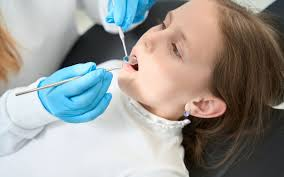Table of Contents
- Chewing and Nutrition
- Speech Development
- Guiding Permanent Teeth
- Jaw and Facial Structure
- Preventing Tooth Decay
- Emotional and Social Development
- Establishing Good Oral Hygiene Habits
- Early Dental Visits
Many parents might wonder, “If baby teeth are temporary, why should we care for them?” The truth is, these primary teeth play a pivotal role in a child’s overall development and set the stage for a lifetime of healthy smiles. Prioritizing the care of baby teeth means building a strong foundation for dental and overall health as your child grows. That’s why it’s crucial to choose trusted, compassionate pediatric dental care, such as pediatric dentistry in Jamestown, to begin your child’s oral health journey on the right track.
Baby teeth do more than just fill the role of making your child’s grin adorable—they are essential for chewing, speech, facial development, and much more. Losing them prematurely or neglecting their care can have lasting effects, making early dental habits and routine visits a cornerstone of lifelong health.
Chewing and Nutrition
Healthy baby teeth enable children to chew their food thoroughly, ensuring proper digestion and nutrient absorption. Children with missing or decayed teeth often shy away from eating crunchy fruits and vegetables, which limits their diets and increases the risk of potential vitamin and mineral deficiencies. Pain from untreated cavities can also make mealtime stressful, potentially affecting a child’s growth and development. Keeping baby teeth healthy enables children to enjoy a wide variety of foods, which supports both their physical development and overall well-being.
Speech Development
Clear communication starts with healthy baby teeth. As young children learn to form words, their teeth help shape the movement of the tongue and mouth for clear pronunciation. Missing or decayed teeth can disrupt this process, leading to unwanted speech impediments or difficulties articulating certain sounds. According to the American Dental Association, caring for your child’s primary teeth is a simple but vital way to support their language development and confidence in everyday conversations.
Guiding Permanent Teeth
Think of baby teeth as placeholders for their adult replacements. Baby teeth hold space in the jaw, guiding permanent teeth into their proper positions as your child grows. If a baby tooth falls out too early, neighboring teeth can shift into the vacant space. This can lead to crowding and crookedness and may necessitate orthodontic treatment, such as braces, in the future. Preserving baby teeth until they naturally fall out is key to preventing future dental complications.
Jaw and Facial Structure
Beyond being placeholders, baby teeth play a crucial role in guiding the proper growth and alignment of the jawbones and facial muscles. Their presence supports symmetrical facial development, which not only impacts a child’s smile but also the shape of their face as they mature. Early loss of baby teeth can hinder this process, sometimes creating long-term changes to a child’s appearance and oral function.

Preventing Tooth Decay
It’s a common misconception that cavities in baby teeth don’t matter. In reality, bacteria from untreated tooth decay can harm permanent teeth developing beneath the gums and even cause painful infections that affect your child’s daily life. Early Childhood Caries (ECC) is a severe form of decay affecting young children and can require extensive dental treatment. By establishing healthy habits, such as avoiding bedtime bottles with sugary drinks, introducing regular brushing with fluoride toothpaste, limiting sugary snacks, and visiting the dentist regularly, parents can significantly reduce the risk of decay and ensure healthier, happier smiles for their children. For more information on preventing ECC and caring for baby teeth, visit the Centers for Disease Control and Prevention.
Left untreated, cavities in baby teeth can also affect speech development and make chewing difficult, which may impact nutrition. Introducing proper oral hygiene habits early helps build a strong foundation for lifelong dental health.
read more : Balance Your Budget, Build Your Future: Smart Moves for Better Finances
Emotional and Social Development
Boosting Confidence
Children who have healthy, sparkling smiles tend to feel better about themselves. Good oral health from a young age helps boost self-esteem, making kids more likely to smile, laugh, and participate in social activities. This sense of confidence can carry over into how they build relationships, approach challenges, and express themselves independently.
Social Interactions with Peers
Strong baby teeth also influence social skills and the development of friendships. Children who are comfortable with their teeth are more likely to communicate effectively, engage with their peers, and enjoy group activities. Poor dental health, on the other hand, can lead to feelings of embarrassment or social isolation. Investing in dental health early gives children the best chance to thrive emotionally and socially throughout childhood and beyond.
Establishing Good Oral Hygiene Habits
Habits learned early on stick with us for life, and oral hygiene is no exception. Teaching children to brush twice a day, floss, and attend regular dental visits helps establish a lifelong commitment to oral health. These routines are easier to learn and maintain when initiated in early childhood, reducing the risk of developing cavities, gum disease, and more serious oral health problems in the future.
Early Dental Visits
Early dental checkups do more than prevent problems—they help your child become comfortable with dental care, support positive habits, and allow dental professionals to catch and address issues early. Regular dental visits ensure your child’s teeth and mouth are developing as they should, setting the tone for a lifetime of healthy, confident smiles.
In summary, baby teeth lay the groundwork for your child’s nutrition, speech, facial structure, and confidence, in addition to acting as the trailblazers for future oral health. Making pediatric dental care and proper oral hygiene a family priority now gives your child lasting benefits and sets them on the path to lifelong dental wellness.

